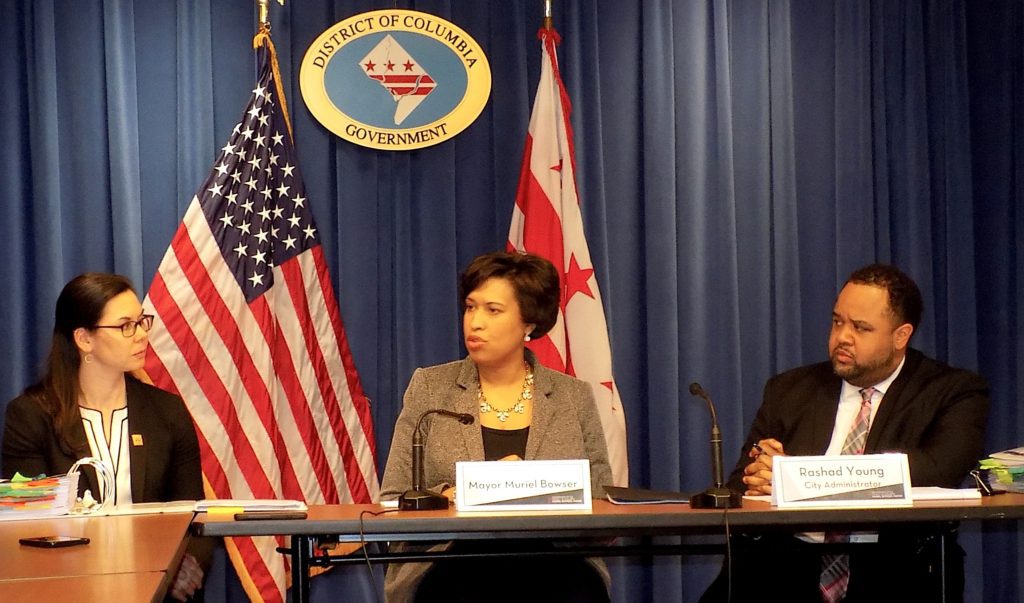Mayor Addresses Budget Questions at Roundtable
By • March 28, 2019 0 627

Mayor Muriel Bowser met with several community newspapers in the Wilson Building on March 27 to outline her proposals for the District’s fiscal 2020 budget and answer questions.
With City Administrator Rashad Young and Jenny Reed, director of the Office of Budget and Management Performance, seated next to her, Bowser dealt with a wide range of topics on the proposed $15.5-billion budget that she submitted to the District Council last week.
Bowser said, “This budget is balanced,” a response to criticism from D.C. Auditor Kathy Patterson, who characterized it as “not fiscally responsible” because it assumed the same rate of growth in the years ahead. (Patterson did say in her testimony to the Council that the proposed budget was balanced.)
On public transit in general, Bowser said, “Maybe it should be free.” Concerning DC Circulator buses, free since February, Bowser said she thought the initiative was going well and saw no real problems. Others might have questioned the use of the public funds in the first place, but no matter. For her, it is about “how do we attract people?” and “get more people off the road.” The Circulator will be extended to Ward 7.
On public safety, the mayor said there’s $3 million to expand the Metropolitan Police Department workforce to the preferred 4,000. There’s the expansion of the Office of Neighborhood Safety and Engagement, which employs violence interrupters, to the tune of $741,000.
On commercial business tax increases, Bowser said: “This has been a booming economy. Some people have benefited from it more than others. The development community has done very well in our city. On the other side, we hear the anxiety that residents feel about being displaced from the District hasn’t waned … We cannot go to the same toolbox.”
On affordable housing, she noted that there is an increase in the Housing Production Trust Fund investment by 30 percent to $130 million. Also, the Housing Preservation Fund will rise from $10 million to $15 million. New on the scene is the Workforce Housing Fund — $20 million on hand to help teachers, first responders, construction workers, social workers and others.
On relieving traffic congestion, one of the projects Bowser favors is the K Street Northwest Transit Way, with a dedicated rapid bus lane. The overhaul of K Street downtown to Georgetown would cost $122.1 million.
On helping D.C. families, she said, “We must keep families in the city.” There are many ways to help, of course, as with the example of feminine hygienic products (now not taxed) and diapers (proposed to be non-taxable).
Bowser commented on D.C. buying such property as the so-called Dave Thomas Circle on New York Avenue NE and RFK Stadium. “I don’t like [the use of] eminent domain,” said Bowser, preferring a market value transaction. She said she thinks “the time has come” for Poplar Point to be redeveloped.
As for any future recession, Bowser said, “We are positioned to weather the storm.”
Normally, after Council approval, the mayor will sign the budget bill and hand it over to the federal government (Congress and the White House). After any discussion, the budget will activate on Oct. 1.

